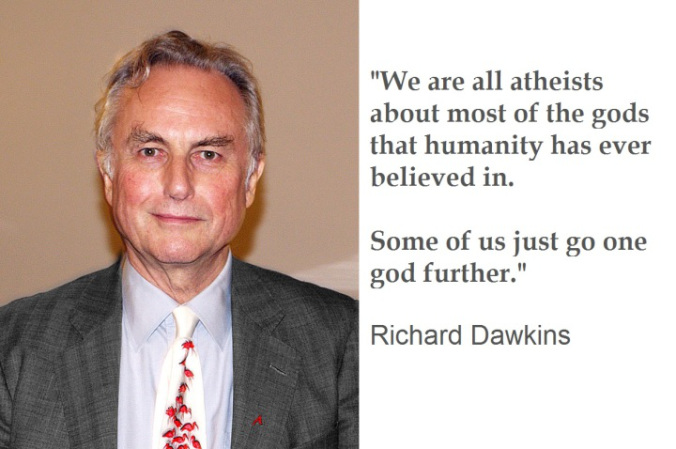= ASTRONAUTICAL EVOLUTION =
Issue 142, 1 October 2018 – 49th Apollo Anniversary Year
| Site home | Chronological index | About AE |
The Atheism Question
Atheism versus theism versus quasi-theism
Having criticised one major failing in The God Delusion by Professor Richard Dawkins in my previous post, I shall devote this page to noting other points of both agreement and disagreement.
The reader should recall that in these posts we are keeping Professor Konrad Szocik at the back of our mind (pronounce his name: Shotsik). His thesis involved “the possible utilisation of some kind of religion and/or religious belief in a future Mars colony” (Spaceflight article, p.92), and he concludes:
“It seems that it is worth bearing in mind possible roles that could be played by religion and religious beliefs in a future Mars colony. It is difficult to find any negative results of the application of religious beliefs [sic!]. … There is no doubt that the positive and beneficial functions of religious beliefs and religion mentioned have worked, and still work, well in human history” (p.96-97).
Curiously, Professor Szocik appears to believe that there is no truth in religion. He justifies his future martian religion purely on two pragmatic grounds: the cognitive science of religion, in which modules in the brain evolved for other purposes also favour the acquisition of religious beliefs, and a direct evolutionary explanation, in which religious beliefs were actively selected for in ancient societies. Perhaps we should dignify this strange viewpoint – which manages to combine both atheism and theism – with the technical term quasi-theism.
NB by “religion” we shall be thinking in terms of the varieties of monotheism originating in the Middle East. It would be difficult and unnecessary to try to include a system such as Buddhism under the same rubric, and it is certainly the various branches of monotheism which intrude most prominently into current events, and are the target of criticism in Professor Dawkins’s book.
Dawkins versus the preachers
The main points made in The God Delusion are as follows:
- The religion attacked in this book is not the quasi-mystical feeling of reverence and awe experienced when one contemplates the intricacy of nature or the majesty of the starry sky, exemplified most famously by Albert Einstein – and shared by Dawkins himself (“which […] we can all trivially subscribe to”, p.183). It is rather the system of belief which claims that a supernatural humanoid personal God exists, living somewhere in the sky or in heaven, and that he has commanded mankind to do one or another thing through ancient holy scriptures which may not be questioned. (ch.1) – Fair enough.
- Everyone assumes that religious people are especially vulnerable to offence, and that they should therefore be treated with deference and respect, no matter how crazy their beliefs may seem. But this is unjustified and absurd. (ch.1) – Agreed. Freedom of speech must include the freedoms to criticise beliefs which one does not share, and to act in ways which ignore the rules they prescribe.
- The God of the Old Testament is arguably the most unpleasant character in all fiction. (ch.2) – Well, one of them, certainly, though the Dalek Supreme might wish to quibble the point.
- The many and various arguments for God’s existence are all fallacious. (ch.3) – Agreed.
- God does not exist, because if he did one would have to ask ‘Who made God?’ (ch.4) – No. As I explained in the previous post, this argument is just as spurious as are those for God’s existence.
- Religion has evolved in humans because it is adaptive. (ch.5) – Maybe. But it might also have arisen partly in response to an innate perception that a supernatural level of reality does exist.
- We do not need revealed religion in order to live moral lives. The claim that we do is seen to be absurd once one gets to grips with the racism, sexism and genocidal wars of the Bible, and once one considers how moral standards have risen over the centuries. (ch.6-7) – Agreed. An evolutionary model for ethics fits the facts better.
- Religion needs to be opposed because it is harmful: it promotes blind faith in things for which there is no evidence, discourages critical thinking, intrudes harmfully into people’s private lives (especially their sex lives), and encourages intolerance to the point of murder. (ch.8) – Yes and no. Excessive intrusion into people’s lives and murder are against the law in any case. But if we are free to claim that religion is unreasonable, religious believers must also be free to claim that it is perfectly reasonable.
- For parents to bring up their children as members of their religion is a form of child abuse which ought not to be tolerated. Children should be brought up to think clearly enough to make their own minds up, when they become adults, on such questions. (ch.9) – No and yes. Parents will naturally want to pass on to their children the truth as they see it. Better this than the would-be scientific state dictating to them what they can and cannot say. But the educational system can and certainly should encourage critical thinking.
- Religion is claimed to provide consolation and inspiration. This inspiration should rather be found in science and reason based on what we genuinely know about the world. (ch.10) – Nobody who’s read C.S. Lewis’s short book “A Grief Observed”, or had a similar experience themselves, would agree that it necessarily provides consolation in time of trouble. But some people do. Again, this is better left to the discretion of the individual rather than prescribed by the scientific state.
As you can see from my comments in italics, I agree with Professor Dawkins about 65% of the time (scoring “maybes” as half an agreement).
The material success of modern civilisation is partly due to our having privatised religion, relegating it to the private sphere and out of public life, and when it intrudes back into public life it is generally in the form of violence or nastiness of some sort. Many specific cases are discussed in detail in The God Delusion, starting, at the end of chapter 1, with the religious violence ostensibly motivated by a dozen cartoons depicting the prophet Muhammad which appeared in a Danish newspaper.
What Professor Dawkins is missing, in my view, is any feel for why the more thoughtful believers adhere to their faith. When he thinks of a believer, what comes to his mind is a fanatic bombing an abortion clinic, brainwashing an impressionable child or attacking a fellow believer in God, though by a different tradition, with a machete or a machine gun. When I think of a believer, I think of C.S. Lewis, or of friends I have known – quiet, ordinary, middle-class people who get on with their lives as peacefully as the rest of us.
References
Konrad Szocik, “Religion in a future Mars colony?”, Spaceflight, March 2017, p.92-97. The author is based at the University of Information Technology and Management, Rzeszow, Poland.
Responses to Szocik’s article appeared on the correspondence page of Spaceflight, June 2017, p.230-231. In addition to an e-mailed letter by myself, the others were written by Peter Davey, James Royse Murphy, James Fradgley, and Keith Gottschalk.
Richard Dawkins, The God Delusion (2006; 10th anniversary edition, Black Swan, 2016).
Please send in comments by e-mail.
Interesting and relevant comments may be added to this page.
| Site home | Chronological index | About AE |

